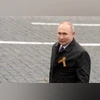Russia's central bank has left its benchmark interest rate at 21 per cent, holding off on further increases as it struggles to snuff out inflation fueled by the government's spending on the war against Ukraine.
The decision comes amid criticism from influential business figures, including tycoons close to the Kremlin, that high rates are putting the brakes on business activity and the economy.
Factories are running three shifts making everything from vehicles to clothing for the military, while a labour shortage is driving up wages and fat enlistment bonuses are putting more rubles in people's bank accounts to spend. All that is driving up prices.
On top of that, the weakening Russian ruble raises the prices of imported goods like cars and consumer electronics from China, which has become Russia's biggest trade partner since Western sanctions disrupted economic relations with Europe and the US.
High rates can dampen inflation but also make it more expensive for businesses to get the credit they need to operate and invest.
Also Read
Critics of the central bank rates and its Governor Elvira Nabiullina have included Sergei Chemezov, the head of state-controlled defence and technology conglomerate Rostec, and steel magnate Alexei Mordashov.
Russian President Vladimir Putin opened his annual news conference on Thursday by saying the economy is on track to grow by nearly 4 per cent this year and that while inflation is an alarming sign at an annual 9.3 per cent, wages have risen at the same rate and that on the whole, this situation is stable and secure.
He acknowledged there had been criticism of the central bank, saying that some experts believe that the Central Bank could have been more effective and could have started using certain instruments earlier.
Nabiullina said in November that while the economy is growing, the rise in prices for the vast majority of goods and services shows that demand is outrunning the expansion of economic capacity and the economy's potential.
Russia's military spending is enabled by oil exports, which have shifted from Europe to new customers in India and China who aren't observing sanctions such as a USD 60 per barrel price cap on Russian oil sales.
(Only the headline and picture of this report may have been reworked by the Business Standard staff; the rest of the content is auto-generated from a syndicated feed.)

)